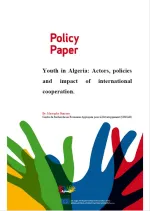Youth in Algeria: Actors, policies and Impact of International Cooperation

SAHWA Policy Paper nº. 13
ISSN 2564-9167
During recent years, the political events within the course of the “Arab Spring” have profoundly upset the MENA region at the political, socioeconomic and even cultural levels. One of the main consequences of this historic period is the emergence of youth as a force for change. These young people are sometimes perceived as a threat by the political powers, sometimes as wealth and an opportunity for development. Both perceptions are eminently political, in as far as development as a target is mainly considered to be an issue of state intervention. Yet, in developing countries, cooperation at international level has been increasing in significance in a way that contributes to the development and more particularly the integration of youth in public policies, not only as a beneficiary of these policies, but also as full actors in the country’s development.
This analysis is clearly valid for Algeria. The country has been confronted over many decades by significant development challenges, and yet it still disposes of numerous potentialities: the demographic weight of youth is very promising (according to the Office national des statistiques - ONS), 26% of the Algerian population is aged 15 to 29 years old; the country is rich qualitatively in terms of human resources because of several hundred thousand young graduates every year from about a hundred universities and high schools (where the number of girls exceeds that of the boys); and the country has considerable infrastructure in the fields of education, health services and facilities, transport networks and so on, as well as great natural resources.
The problem is that in spite of this potential, the needs of young people are not met. It leads us to wonder about the efficiency of government policies targeting young people. Considering the social conditions and macroeconomic indicators, which are indeed very favourable to steady socioeconomic growth, it is striking to notice the government’s difficulties meeting young people’s expectations. Apparently, Algeria hardly needs to benefit from high-level expertise through solid cooperation with international partners. To date, the impact of the international cooperation between Algeria and its partners is not tangible. This is due, essentially, to the fact that youth is not a great priority for the Algerian government and for its international partners.